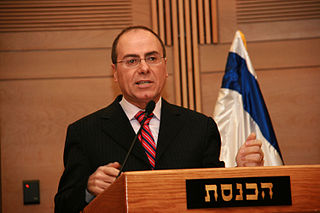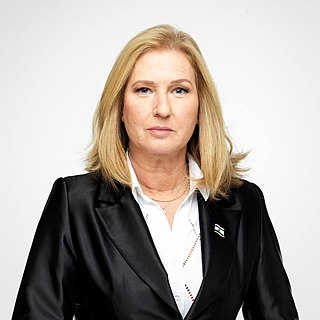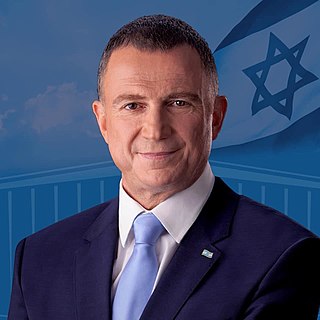
Ariel Sharon was an Israeli general and politician who served as the 11th prime minister of Israel from March 2001 until April 2006.

Shaul Mofaz is a retired Israeli military officer and politician. He joined the Israel Defense Forces in 1966 and served in the Paratroopers Brigade. He fought in the Six-Day War, Yom Kippur War, 1982 Lebanon War, and Operation Entebbe with the paratroopers and Sayeret Matkal, an elite special forces unit. In 1998 he became the IDF's sixteenth Chief of staff, serving until 2002. He is of Iranian Jewish ancestry.

Likud, officially known as Likud – National Liberal Movement, is a major right-wing political party in Israel. It was founded in 1973 by Menachem Begin and Ariel Sharon in an alliance with several right-wing parties. Likud's landslide victory in the 1977 elections was a major turning point in the country's political history, marking the first time the left had lost power. In addition, it was the first time in Israel that a right-wing party received the most votes. After ruling the country for most of the 1980s, the party lost the Knesset election in 1992. Likud's candidate Benjamin Netanyahu won the vote for prime minister in 1996 and was given the task of forming a government after the 1996 elections following Yitzak Rabin's assassination. Netanyahu's government fell apart after a vote of no confidence, which led to elections being called in 1999 and Likud losing power to the One Israel coalition led by Ehud Barak.

Zion Silvan Shalom is an Israeli politician who served as a member of the Knesset for Likud between 1992 and 2015. He held several prominent ministerial positions, including Vice Prime Minister and Minister of the Interior. He resigned on 24 December 2015 following allegations of sexual harassment. Later on, the Attorney-General closed this investigation and said these claims were unsubstantiated.
Yisrael Beiteinu is a conservative political party in Israel, generally classified as far-right. The party's base was originally secular Russian-speaking immigrants, although support from that demographic is in decline. The party describes itself as "a national movement with the clear vision to follow in the bold path of Zev Jabotinsky", the founder of Revisionist Zionism. It has primarily represented immigrants from the former Soviet Union, although it has attempted to expand its appeal to the broader Jewish Israeli population.
Elections for the 17th Knesset were held in Israel on 28 March 2006. The voting resulted in a plurality of seats for the then-new Kadima party, followed by the Labor Party, and a major loss for the Likud party.

Kadima was a centrist and liberal political party in Israel. It was established on 24 November 2005 by moderates from Likud largely following the implementation of Ariel Sharon's unilateral disengagement plan in August 2005, and was soon joined by like-minded Labor politicians.

Tziporah Malka "Tzipi" Livni is an Israeli politician, diplomat, and lawyer. A former member of the Knesset and leader in the center-left political camp, Livni is a former foreign minister, vice prime minister, minister of justice, and leader of the opposition. She is known by some for her efforts to resolve the Israeli–Palestinian conflict.

Uzi Landau is an Israeli politician and systems analyst. He served as a member of the Knesset for Likud between 1984 and 2006, and for Yisrael Beiteinu between 2009 and 2015. He also held several ministerial posts, including Minister of Public Security, Minister in the Prime Minister's Office, Minister of Energy and Water Resources and Minister of Tourism.

Miriam "Miri" Regev is an Israeli politician who currently serves as Minister of Transport, National Infrastructure and Road Safety. Previously she was a brigadier-general in the Israel Defense Forces and IDF Spokeswoman, Minister of Culture and Sport and Acting Prime Minister of Israel.

Gilad Menashe Erdan is an Israeli politician and diplomat who served as Permanent Representative of Israel to the United Nations from 2020 through 2024.

Dan Meridor is an Israeli politician and minister. A longtime member of the Likud party, in the late 1990s he became one of the founders of the Center Party. He rejoined Likud a decade later, and returned to the Knesset following the 2009 elections. Meridor served at various times as Deputy Prime Minister, Minister of Finance, Minister of Justice and Minister of Intelligence and Atomic Energy in the Israeli Cabinet. In 2014, Meridor succeeded Avi Primor as president of the Israel Council on Foreign Relations, an institute of international affairs which operates under the auspices of the World Jewish Congress.

Yuli-Yoel Edelstein is an Israeli politician who served as Minister of Health from 2020 to 2021. One of the most prominent refuseniks in the Soviet Union, he was the 16th Speaker of the Knesset from 2013 until his resignation on 25 March 2020.

Israel Katz is an Israeli politician and member of the Knesset for Likud currently serving as Minister of Defense and a member of the Security Cabinet of Israel. Katz has previously served as Minister of Agriculture, Minister of Transport, Minister of Intelligence, Minister of Energy, Minister of Finance, and twice as Minister of Foreign Affairs. On 5 November 2024, it was announced that he would be nominated by Prime Minister Netanyahu as Defense Minister after Yoav Gallant was dismissed.

Gila Gamliel-Demri is an Israeli politician who currently serves as Minister of Science and Technology, and also as a member of the Knesset for Likud. She also previously served as Minister for Social Equality and as Minister of Environmental Protection.
Early legislative elections were held in Israel on 22 January 2013 to elect the 120 members of the nineteenth Knesset. Public debate over the Tal Law had nearly led to early elections in 2012, but they were aborted at the last moment after Kadima briefly joined the government. The elections were later called in early October 2012 after failure to agree on the budget for the 2013 fiscal year.

Haneen Zoabi, is a Palestinian-Israeli politician. The first Arab woman to be elected to the legislature on an Arab party's list, she served as a member of the Knesset for the Balad party between 2009 and 2019. In 2021, she was convicted of forgery and fraud after pleading guilty.

Kulanu was a centrist political party in Israel founded by Moshe Kahlon that focused on economic and cost-of-living issues.

Amir Ohana is an Israeli lawyer, former Shin Bet official and politician who has served as the Speaker of the Knesset since 2022, and as a member of the Knesset for Likud. He previously held the posts of Minister of Justice and Minister of Public Security. He was the first openly gay right-wing member of the Knesset and the first openly gay man from Likud to serve in the Knesset. He is also the first openly gay person to be appointed as a minister in the Israeli government and the first openly gay Speaker of the Knesset.
A leadership election was held by the Likud party on 19 December 2005. former prime minister and party leader Benjamin Netanyahu defeated Deputy Prime Minister and Minister of Foreign Affairs Silvan Shalom, as well as candidates Moshe Feiglin and Israel Katz.


















